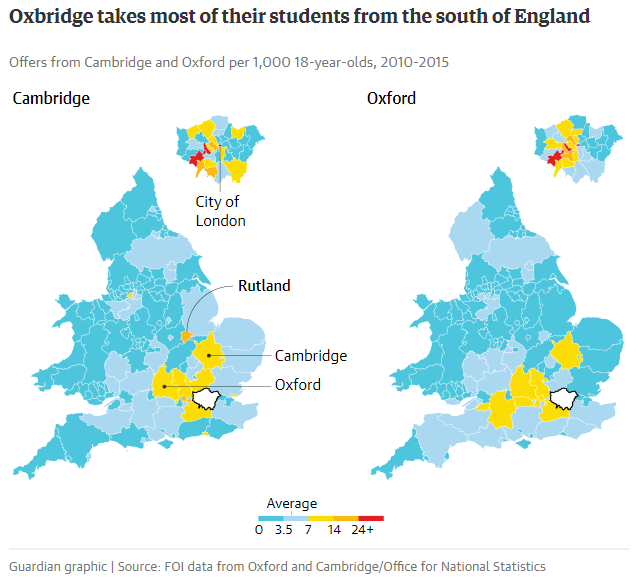In the Guardian, Sally Weale, Richard Adams and Helena Bengtsson disclose the shocking news that Oxford and Cambridge select very few students from outside the two wealthiest tiers of society or from outside London and the southeast:
Oxford and Cambridge universities have gone backwards on the socio-economic diversity of their student bodies, with more than four in five students coming from the most privileged groups, a Guardian analysis has found.
Data released to the MP for Tottenham, David Lammy, under the Freedom of Information Act shows that 82% of offers from Oxford and 81% from Cambridge went to students from the top two socio-economic groups in 2015, up from 79% at both universities five years earlier.
Lammy, who has campaigned for greater ethnic and socio-economic diversity at Oxbridge, said he was appalled that the universities were moving backwards on socio-economic background measurements. “This data clearly shows that a privileged background is still the key to getting through the Oxbridge admissions process,” he said.
The data shows huge regional disparities in offers, with some parts of England and Wales failing to secure a single place for years while students in London and the south-east received almost half of all offers.
Despite the two universities’ extensive efforts to increase the diversity of their intake, new research shows there are still swaths of the country with low rates of application and disproportionately fewer offers.

Students from benighted, uncivilized places like Middlesbrough are rarely able to gain admission:
Middlesbrough, where 101 students applied to Oxbridge, secured just 11 places in five years.
Carolyn Yule, the director of A-levels at Middlesbrough College, said that not one of her Oxbridge applicants had been successful in her three years in the job. “One of the students we did a lot of work with, he wanted to read mathematics and he was absolutely fantastic,” she said. “He got an interview and could not have done any more, but he didn’t get in. We didn’t really get a lot of feedback from them. We don’t even feel we know why our students don’t get in.”
However, it’s important to find out how many students applied to make sense of the numbers accepted:
There are 38 colleges at Oxford, 31 at Cambridge (close enough anyway). Given that not everyone with that sort of level of academic achievement actually tries to enter Oxbridge then what do we think should be the offer rate to these Black Britons? It’s most certainly not 4 offers per college per year, is it? Or 6, or whatever 400 divided by 70 is.
Given the small numbers the stats are going to be weird anyway, but what is the number of total offers made by all colleges, related to the total number of people who get 3 A grades? Vriance from that would probably be a good starting point for us.
Lammy does however make a good point:
With this degree of disproportionately against black students, it is time to ask the question of whether there is systematic bias.
I’m certainly willing to believe there is. I am not deluded enough to think that Britain is perfect, nor its education system. But I would probably start with the thought that the bias is in the system that leads to the 400 not with the selection within it.
H/T to Colby Cosh for the link.




